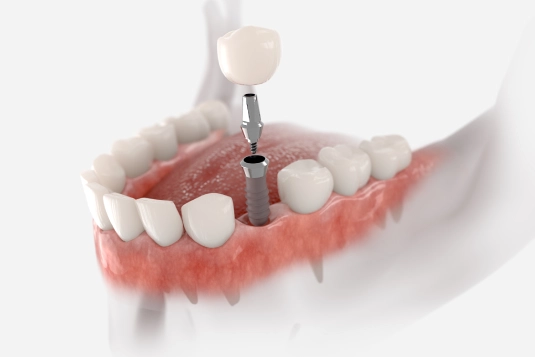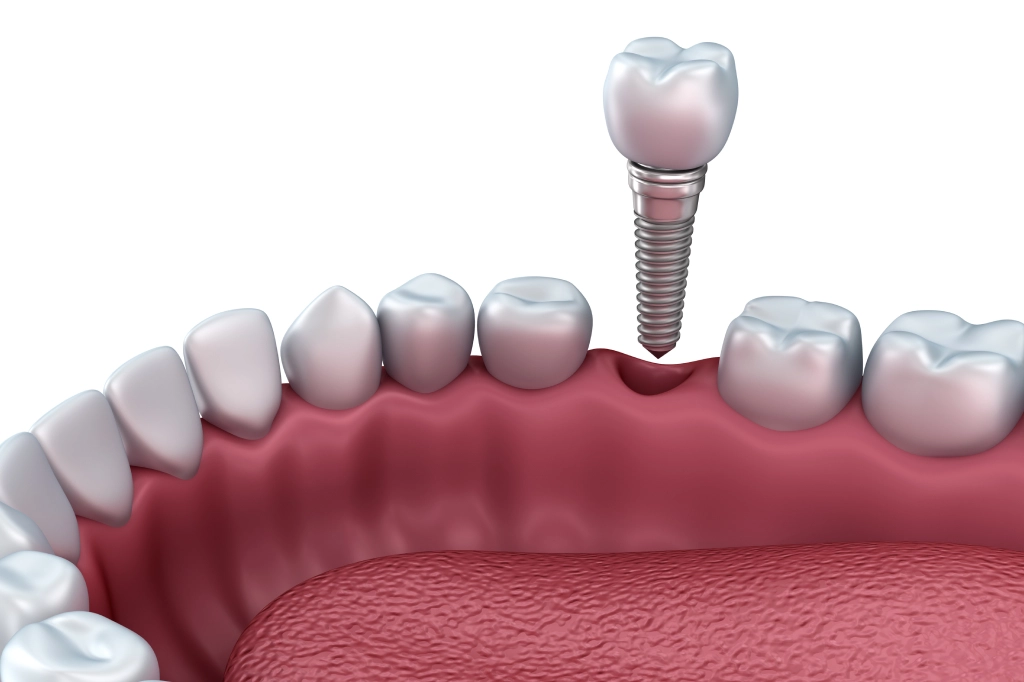Have you ever wondered, “How Painful Is Getting a Dental Implant?” It’s a common concern for many people considering dental implant surgery to replace missing teeth. The thought of undergoing oral surgery can be daunting, especially when it comes to potential pain during and after the procedure.
In this guide, we’ll dive into the reality of what to expect in terms of pain during dental implant surgery. Our goal is to provide clarity and ease any worries you may have about the process. Let’s explore the truth behind the perceived pain of getting a dental implant.
What does the Dental Implant Procedure entail?
The dental implant procedure involves several steps:
Consultation and Planning
Initially, you’ll have a consultation with your dentist to discuss the treatment goals and assess your oral health. This may include X-rays, impressions, and digital imaging to create a personalized treatment plan.
Implant Placement
During the surgical procedure, the dental implant, which resembles a small screw, is precisely placed into the jawbone. This step is done under local anesthesia to ensure your comfort.

Healing and Integration
After implant placement, the jawbone undergoes a process called osseointegration, where it fuses with the implant over several months. This integration is necessary for the stability and success of the implant.
Abutment Attachment:
Once osseointegration is complete, an abutment is attached to the implant. This abutment serves as a connector for the final restoration.
Crown Placement
Finally, a dental crown, which resembles a natural tooth, is placed onto the abutment. This crown completes the restoration and provides functionality and aesthetics.
How much pain should you expect from dental implant surgery?
It’s a common worry fueled by the scary images and stories found online. But in reality, it’s not as bad as it seems.
On a scale of one to ten, with one being minimal discomfort and ten being excruciating pain, a simple dental implant procedure usually falls between two and three in the first day or two. This discomfort is managed with over-the-counter pain relievers like Tylenol or Advil.
The pain you feel during dental implant surgery isn’t mainly from the drilling or implant placement but rather from the manipulation of soft tissue.
For implants that don’t require lifting gum tissue, patients often report minimal pain, around one to two. If a flap of gum tissue is lifted, the pain may increase a bit initially, but it usually gets better after the first day.
If bone grafting is needed, the pain may be higher, around five or six, especially in the first three days. Stronger pain relievers may be prescribed to help manage this discomfort.
The pain usually lasts for one to three days and then starts to go away. Keep in mind that everyone’s pain tolerance is different, so your experience may vary.
Throughout the entire process, your dentist will ensure that you’re comfortable and informed at every step, and they’ll provide post-operative care instructions to promote healing and successful integration of the implant.
How do you manage pain during and after Dental Implant surgery?
Managing pain during and after dental implant surgery is vital for a smooth recovery. While the procedure itself is typically painless due to modern anesthesia techniques, discomfort may arise afterward when the anesthesia wears off and the body begins to heal.
Here are some effective strategies for managing pain during and after dental implant surgery:

Local Anesthesia
Your dentist will give you local anesthesia during the dental implant surgery to numb the treatment area so that you don’t feel any pain during the procedure. Additionally, sedation options may be available for patients experiencing anxiety or fear.
Prescription Pain Medication
After dental implant surgery, your dentist may prescribe painkillers to help alleviate discomfort during the initial recovery period. These may be non-steroidal anti-inflammatory drugs (NSAIDs) or stronger pain relievers, depending on the severity of the pain.
Over-the-Counter Pain Relievers
In addition to prescription medication, over-the-counter pain relievers such as ibuprofen or acetaminophen are effective in reducing pain and inflammation following dental implant surgery. Be sure to follow your dentist’s instructions and dosage recommendations.
Cold Compresses
When you apply a cold compress to the cheek or jaw area, it helps reduce swelling and numb the treatment site, thereby providing temporary relief from pain and discomfort. Wrap a few ice cubes in a cloth or use a gel ice pack and put it on the outside of your face for 15-20 minutes at a time.
Soft Diet
Eat a soft diet consisting of foods that require minimal chewing to avoid putting undue pressure on the implant site. Opt for mashed potatoes, yogurt, smoothies, and other soft foods that won’t irritate the surgical area.
Avoiding Certain Activities
To prevent aggravating the surgical site and worsening pain, avoid strenuous physical activities, smoking, and drinking through a straw during the initial recovery period. These activities can increase blood flow and pressure to the surgical area, leading to discomfort and delayed healing.
Good Oral Hygiene
Maintain good dental hygiene to prevent infection and promote healing after dental implant surgery. Follow your dentist’s post-operative care instructions, which may include gentle brushing and rinsing with an antimicrobial mouthwash.
Conclusion
Still wondering, “How Painful Is Getting a Dental Implant?” Many people worry about the pain of getting a dental implant, but it’s often not as bad as they fear. While you may feel some discomfort during and after the procedure, advancements in techniques and pain management mean most patients experience minimal pain. By knowing what to expect and following the dentist’s instructions after surgery, you can go through the process with confidence and end up with a great smile.
Ready to take the next step toward a brighter smile? Schedule a consultation with Palisades Dental Care in Dumont, NJ, today! Book an appointment online or call us at (201) 279-0440 for new patients and (201) 568-9811 for existing patients. Let us help you achieve the smile of your dreams!
FAQs
Is getting a dental implant painful?
While some discomfort is normal, advancements in anesthesia and pain management techniques have made dental implant procedures relatively pain-free for most patients.
How long does the pain last after getting a dental implant?
Pain typically subsides within a few days after the procedure. Over-the-counter pain relievers can help manage any discomfort during this time.
Are there any factors that can affect how painful a dental implant procedure is?
Yes, factors such as the extent of surgery, individual pain tolerance, and the need for additional procedures like bone grafting can influence the level of discomfort experienced during and after getting a dental implant.


